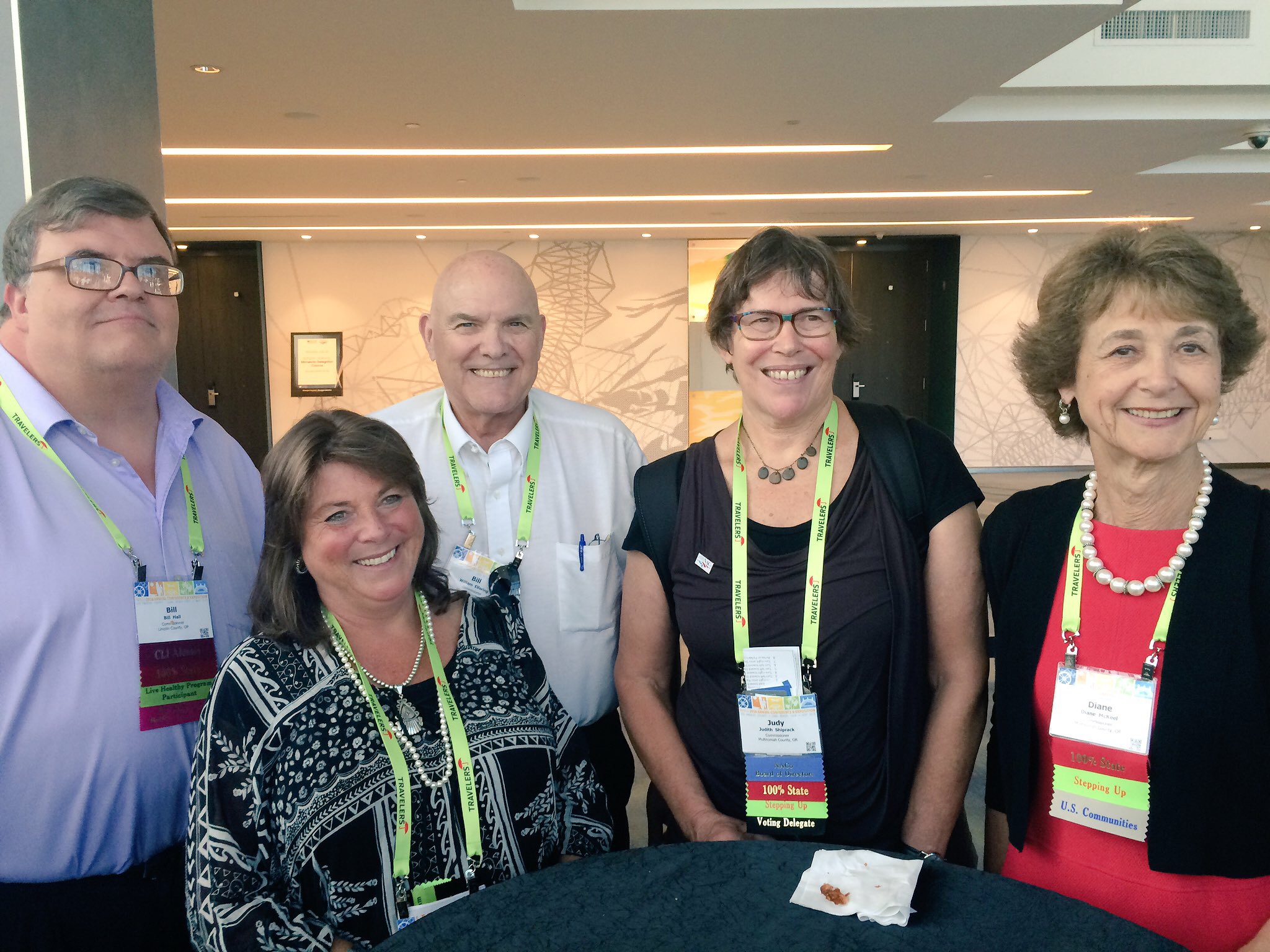By: Mckenzie Farrell, Association of Oregon Counties
August 1, 2016
Twenty-two county officials from Oregon joined over 3,000 county elected officials from across the United States July 22-25, 2016 at the National Association of Counties (NACo) Annual Conference in Los Angeles County.
NACo’s Annual Conference provides county officials with the opportunity to vote on NACo’s policies related to federal legislation and regulation; network with colleagues, learn about issues impacting counties and the innovative county programs being implemented across the country.
“NACo allows our county to bring its issues to the national level, something that would normally be cost-prohibitive for a rural, economically depressed county. We are also able to learn from other counties and their experiences, and realize that we share many of the same challenges and opportunities,” stated NACo Land Subcommittee Chair and Coos County Commissioner Melissa Cribbins.
During the conference Oregon county officials, staff and the Association of Oregon Counties (AOC) worked to ensure that platform changes and resolutions aligned with the interests of Oregon’s 36 counties. A number of resolutions were submitted by Oregon on a variety of topics, including: woody biomass, the western partnership center, the National Flood Insurance Program, veterans and Secure Rural Schools.
NACo’s policy steering committees discussed, debated and adopted the proposed platform changes and policy positions, including all of the recommendations submitted from Oregon.
NACo Veterans and Military Services Committee Vice Chair and Multnomah County Commissioner Diane McKeel led a successful effort to add veteran’s language to six NACo policy committee platforms.
“This year’s NACo Annual Conference was an amazing step forward for the work we do to better serve our veterans and their families. These platform changes will anchor stronger NACo veterans’ advocacy for years to come,” stated Commissioner McKeel.
The addition of veterans language to NACo policy committee platforms supports national advocacy work underway, including the collection of veterans data in the American Community Survey (The Census), maintaining healthcare benefits for veterans who are in jail but have not been found guilty of a crime, and expanding funding for homeless veterans as part of the Housing and Urban Development (HUD)-Veterans Assisted Supportive Housing (VASH) program.
This effort included support from Clackamas County Commissioner Martha Schrader, Umatilla County Commissioner Bill Elfering, Lincoln County Commissioner Bill Hall, Multnomah County Commissioner Judy Shiprack, Multnomah County Policy Advisor Sean Files, AOC Policy Manager Andy Smith, and NACo Associate Legislative Director Jack Peterson.
Thanks to the combined efforts of Oregon, NACo is poised to play a major role in veterans policy moving forward,” stated AOC Executive Director Mike McArthur.
Congratulations is also in order for Commissioner Bill Hall who successfully advocated for a renewal of a veterans related NACo resolution in the Health Steering Committee urging Congress to pass the “The Toxic Research Exposure Act” (H.R. 1769 and S. 901). This legislation would create a toxins research unit within the VA to proceed with medical research on how exposure to agent orange, burn pits and depleted uranium (“toxins”) may affect the biological health of children and grandchildren of veterans who served in the military.
Commissioner Hall also participated in a three person panel highlighting efforts around the country to end veterans’ homelessness. He discussed the three-year effort in Lincoln County to secure housing vouchers for homeless veterans through the VASH (Veterans Assisted Supportive Housing) program, which provides a rent voucher (similar to Section 8) and case management services.
NACo Western Interstate Region (WIR) President and Jackson County Commissioner Doug Briedenthal, lead a robust WIR Board of Directors meeting covering the proposed Western Partnership Center, increasing intergovernmental partnerships with Native American communities, and promoting economic development in western communities.
Commissioner Cribbins presented a NACo platform change during the Environment, Energy and Land Use Steering Committee meeting regarding stormwater runoff on forestlands. In addition, NACo Community, Economic and Workforce Development Steering Committee Chair and Columbia County Commissioner Tony Hyde presented a resolution supporting the use of woody biomass as an energy source. Commissioner Cribbins and Jackson County Commissioner Doug Breidenthal also teamed up to pass a resolution on FEMA’s implementation of the Biological Opinion of Reasonable and Prudent Alternatives in the National Flood Insurance Program.
During the NACo Achievement Awards Clackamas County was honored with five awards for implementing innovative county government programs, including: Adoption of Land Use Regulations for Marijuana-Related Businesses, RiverHealth Stewardship Program, Clackamas County Citizen Academy, Leaders in Sustainability: Resources for Sustainable Workplaces, A Safe Place Family Justice Center: Wrap Around Services for Domestic Violence Victims.
“NACo offers programs and services to help all counties succeed and thrive. From no-cost prescription drug benefits for the public to technical support, NACo is an essential partner in county success. I enjoy participating in NACo and NACo leadership as it helps me bring ideas and strategies back to Clackamas County to support our work on behalf of the public,” stated NACo Economic Development Subcommittee Chair and Clackamas County Commissioner Martha Schrader.
Conference topics covered a wide range of issues from human trafficking and the public health threat of the Zika virus, to reducing the number of mentally ill in jails and protecting employees and residents from active shooters, to drought, natural disaster resilience, and innovations in water infrastructure.
Attendees also had the pleasure of hearing from Diana Nyad, record-breaking athlete, sports broadcaster and author; Jack Dangermond, co-founder and president of Esri; Jon Meacham, presidential historian and Pulitzer prizewinner; and Kareem Abdul-Jabbar, six-time NBA champion, author, filmmaker and columnist.




